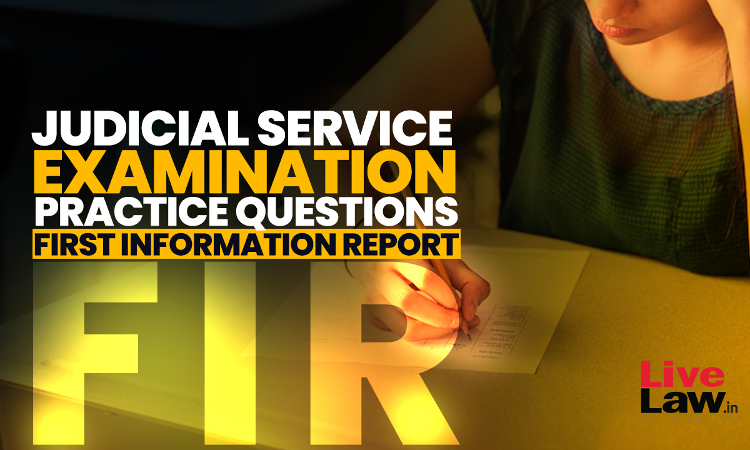Judicial Service Examination: Practice Questions- First Information Report
M.A. RASHID
18 Dec 2022 9:44 AM IST

In which of the following is a ground to quash the FIR?
(i) Where the allegations made in the First Information Report or the complaint, even if they are taken at their face value and accepted in their entirety do not prima facie constitute any offence or make out a case against the accused.
(ii) Where the allegations in the First Information Report and other materials, if any, accompanying the F. I. R. do not disclose a cognizable offence, justifying an investigation by police officers under S.156 (1) of the Code except under an order of a Magistrate within the purview of S.155(2) of the Code.
(iii) Where the uncontroverted allegations made in the FIR or complaint and the evidence collected in support of the same do not disclose the commission of any offence and make out a case against the accused.
(iv). Where, the allegations in the F.I.R. do not constitute a cognizable offence but constitute only a non cognizable offence, no investigation is permitted by a police officer without an order of a Magistrate as contemplated under S.155(2) of the Code.
(v). Where the allegations made in the F.I.R. or complaint are so absurd and inherently improbable on the basis of which no prudent person can ever reach a just conclusion that there is sufficient ground for proceeding against the accused.
(a) i ,ii and iii only
(b) ii,iii, and v only
(c) i ,iii and iv only
(d) i, ii, iii, iv and v
Ans.(d) [ 1992 AIR SCW 237]
Which of the following Section of Code of Criminal Procedure deals with 'information as to non-cognizable cases and investigation of such cases'?
(a) 154
(b) 155
(c) 156
(d) 157.
Ans.(b)
When information is given to an officer in charge of a police station of the commission within the limits of such station of a non-cognizable offence,
(a) he shall register an FIR
(b) he may or may not register an FIR according to his discretion
(c) he shall enter or cause to be entered the substance of the information in a book to be kept by such officer and refer the informant to the Magistrate.
(d) None of the above.
Ans.(c) [ 155(1)]
No police officer shall investigate a non-cognizable case without the order of a Magistrate having 784. No police officer shall investigate a non-cognizable case without the order of a Magistrate having power to try such case or commit the case for trial. The Statement is
(a) True
(b) False
(c) Partly Correct
(d) None of the above
Ans.(a)[ S.155(2)]
Which of the following power is not available to a police officer who receives an order from the Magistrate to investigate a Non-Cognizable offence?
(a) Power to search
(b) Power to seize
(c) Power to arrest
(d) None of the above
Ans.(c)[ S.155(3)]
Where a case relates to two or more offences of which at least one is cognizable, the case shall be deemed to be
(a) a cognizable case,
(b) a non-cognizable
(c) a warrant case
(d) None of the above
Ans.(a)[ S.155(4)]
At the stage of registration of a crime or a case on the basis of the information disclosing a cognizable offence in compliance with the mandate of S.154 (1) of the Code, the concerned police officer
(a) cannot embark upon an enquiry as to whether the information, laid by the informant is reliable and genuine
(b) cannot refuse to register a case on the ground that the information is not reliable or credible.
(c) Both (a) and (b)
(d) None of the above
Ans.(c)[AIR 2007 SC 1274]
Which of the following Section of Code of Criminal Procedure deals with 'Police officer's power to investigate cognizable case'
(a) 154
(b) 155
(c) 156
(d) 157.
Ans.(c)
Any officer in charge of a police station may, …………………investigate any cognizable case which a Court having jurisdiction over the local area within the limits of such station would have power to inquire into or try under the provisions of Chapter XIII.
(a) with the order of a Magistrate,
(b) without the order of a Magistrate,
(c) with the order of the Magistrate or a superior Police officer
(d) None of the above
Ans.(b)[156(1)]
A proceeding of a police officer in any case shall at any stage be called in question on the ground that the case was one which such officer was not empowered under this section to investigate. The Statement is
(a) True
(b) False
(c) Partly Correct
(d) None of the above
Ans.(b)[ S.156(2)]
A Magistrate empowered under Section 190 may order an investigation by police in to a cognizable offence. This provided in Section …………….of Code of Criminal Procedure
(a) 154(3)
(b) 155(3)
(c) 156(3)
(d) 157(4).
Ans.(c)
Is Section 156(1) also empower a Magistrate to stop an investigation undertaken by the police?
(a) Yes
(b) No
(c) depends
(d) None of the above.
Ans.(b) [2007 (1)SCC 1]
Whether in view of Clause (a) of the first Proviso to Section 202 (1) of the Code of Criminal Procedure, 1973, a Magistrate who receives a complaint, disclosing an offence exclusively triable by the Court of Session, is debarred from sending the same to the police for investigation under Section 156 (3) of the Code?
(a) Yes
(b) No
(c) depends
(d) None of the above.
Ans.(b) [AIR 1979 SC 1672]


